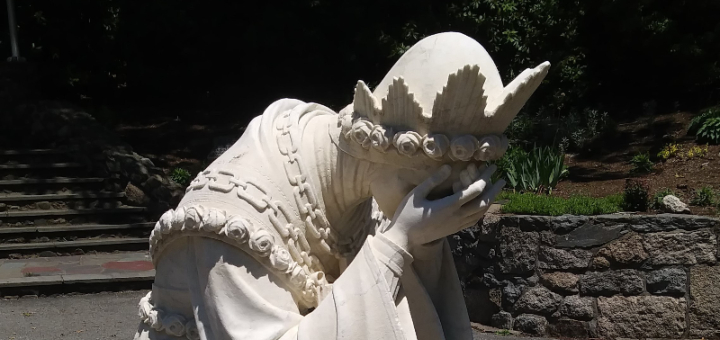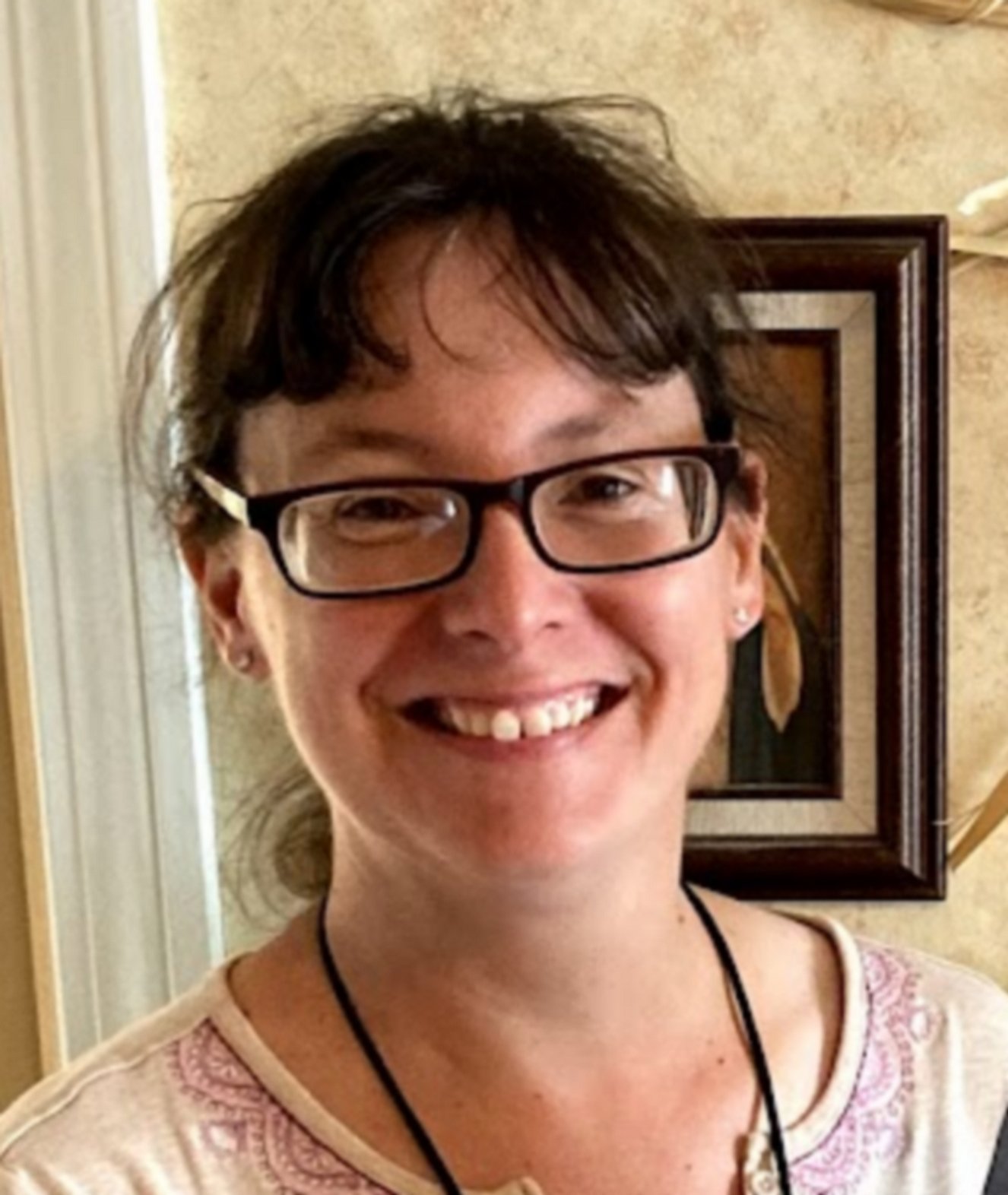
 Copyright 2019 Patrice Fagnant-MacArthur. All rights reserved.[/caption]
In 1846, the people of the small town of Corps, located in the French Alps, had largely forgotten God. That was soon about to change. Our Lady of La Salette appeared to two peasant children, sharing a warning message of the importance of Sunday observance and respecting the name of the Lord. She told the young children to share that message with the world. It is a message even more needed in our world today.
Our Lady of La Salette wept as she delivered her message on September 19, 1846, inviting the world to repentance. She was speaking out against Sunday work and blasphemy, violations of the second and third commandments: keep holy the Sabbath and do not take the Lord’s name in vain. Indirectly, these are also violations of the first commandment, because those who work on Sunday or take God’s name in vain are not putting God before everything else as the first commandment directs us to do. These sins are the reason for her tears.
Back in 1953, Fr. James O’Reilly wrote:
Copyright 2019 Patrice Fagnant-MacArthur. All rights reserved.[/caption]
In 1846, the people of the small town of Corps, located in the French Alps, had largely forgotten God. That was soon about to change. Our Lady of La Salette appeared to two peasant children, sharing a warning message of the importance of Sunday observance and respecting the name of the Lord. She told the young children to share that message with the world. It is a message even more needed in our world today.
Our Lady of La Salette wept as she delivered her message on September 19, 1846, inviting the world to repentance. She was speaking out against Sunday work and blasphemy, violations of the second and third commandments: keep holy the Sabbath and do not take the Lord’s name in vain. Indirectly, these are also violations of the first commandment, because those who work on Sunday or take God’s name in vain are not putting God before everything else as the first commandment directs us to do. These sins are the reason for her tears.
Back in 1953, Fr. James O’Reilly wrote:
Never more than now have men so much needed the salutary teachings of La Salette. We look out on a world today that seems to be in complete revolt against all authority, human and divine. ... The Christian principles that once ruled our lives and fostered obedience, modesty, and respect, have been repudiated as old-fashioned. In every department of human activity, in the home, in business, in our national life, our educational system, all forms of entertainment, in music, literature and art, the seeds of revolt, irreverence, indecency and unbridles license have been cultivated, and now we are reaping the whirlwind in a national crime wave, in gross immorality, in an alarming breakdown of the marriage bond and of home life that seems unparalleled in nearly two thousand years of Christianity... [Our Lady’s] tears still flow, her work of merciful intercession still goes on for a heedless world. What then, does she ask of each one of us? She pleads for our conversion, and in her gentle maternal way urges us all to lead lives of prayer, penance and reparation. (James P. O’Reilly, M.S., The Story of La Salette: Its History and Sequels, Divine Word Publications, 1953, 163-164.)How is it possible that those words were written in the 1950s, an era we now look back on as so conservative compared to our own? How much more in need is our world today when so many have turned their backs on God and religious practice? Our Lady wants all of us to be reconciled to her Son. She wants this so much that she weeps for her children who have fallen away.
These tears are La Salette’s most powerful unspoken message. The beautiful Lady weeps but she never refers to her tears, never so much as alludes to them. They are meant to speak for themselves and they do. They are an unspoken message but they add a crucial dimension to her words ... [The tears] are liquid sorrow, molten streams of pain running down the Lady’s face and a very obvious show of love ... [They] highlight the words and give urgency and crucial importance to the entire message. If someone from heaven, and the Blessed Virgin at that, is provoked to tears over disrespect for the Day of the Lord and the Name of Jesus, then the word is out that these offenses are more evil than people think they are and should be carefully avoided. (Fr. Normand Theroux, M.S., Our La Salette Mission: To Reconcile Her People With Her Son, La Salette Communications Center Publications, 2017).How true that last statement is. How many people think nothing of skipping Mass (or never attend at all)? How often do we hear the name of the Lord used in vain? Truly, these acts matter to God.
Not honoring God in his Name and on his day, not worshiping, not praying are the root causes, the deep-seated sins against God that bring on those ‘sins against the neighbor.’ The Lady says, without actually pronouncing the words, that serving God and serving the neighbor are not two acts, but one. On the face of it, the La Salette message is limited in its demands: Mass, prayer, penance, and respect for Christ’s name appear to be the bare bones of religion ... On the other hand, when these elements are observed well, they launch an intimate and powerful Christian life, for all of Christian life is based on those demands. (Theroux)Our Blessed Mother took the people to task for not paying attention to the sorrow that they were causing her and her Son. “She also reproached her people for not seeing the signs of the times when the potatoes rotten. ‘You paid no least heed,’ she said.” (Theroux) Do we pay heed to the world around us? Our world, our environment, is in such pain. Our physical world is connected to the spiritual realm. Yes, we need to take practical, concrete actions to help our physical world. But the role of the spiritual should not be neglected. What would our world look like if everyone returned to God, loved God and neighbor, respected God’s name, and kept the Lord’s Day holy? It isn’t too late. Our Blessed Mother still weeps for us. She wants us to return to her Son. Will we answer her plea? For more information on Our Lady of La Salette, please read Our Lady of La Salette: A Mother Weeps for her Children. To find out more about Our Lady of La Salette, please visit LaSalette.org.
Copyright 2019 Patrice Fagnant-MacArthur This article contains Amazon affiliate links; your purchases through these links benefit the author.
About the Author

Patrice Fagnant-MacArthur
Patrice Fagnant-MacArthur has a master’s degree in applied theology and is the author of The Power of Forgiveness, Our Lady of La Salette: A Mother Weeps for Her Children, and The Life and Lessons of St. Zelie Martin. A mother of three, she is the editor of TodaysCatholicHomeschooling.com as well as a freelance writer and editor.


.png?width=1806&height=731&name=CatholicMom_hcfm_logo1_pos_871c_2728c%20(002).png)
Comments